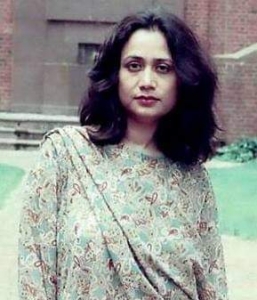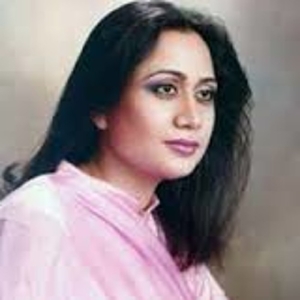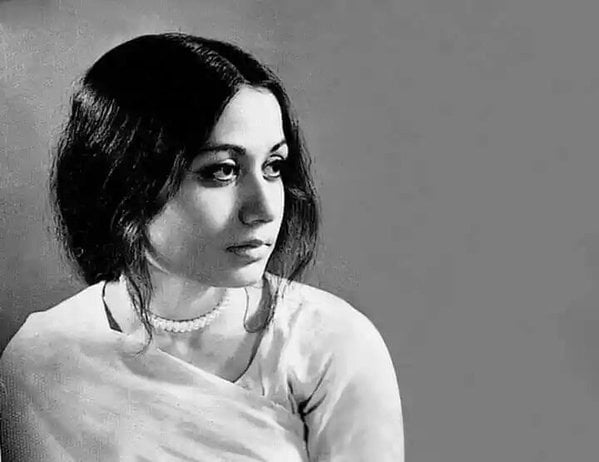Parveen Shakir (1952-1994) has defined the sensibilities of several generations and beyond. At the relatively young age of 42 years, Parveen Shakir died on an empty Islamabad boulevard, as if this was an essential part of her romantic persona. But she had lived a full life where poetry and tragedy intersected each other and became inseparable from her being.
As a young student in high school, I was introduced to Shakir’s romantic poetry, which was best represented by her first collection of poetry Khushbu. I had won an essay writing competition in Urdu and a delightful award came in the form of this tender volume of poetry. Since then I have always returned to bits and pieces of Khushbu . It may not be great according to the cannons of literary theory, but it is spontaneous, fresh and almost dreamlike. Shakir was barely 24 years old when Khushbu was published and since its first edition, this book has been a best seller wherever Urdu poetry is read or appreciated.
Khushbu turned Shakir into a celebrity. Aside from mushairas, newspapers and public fora, she was ever-present on the Pakistan television, perhaps as its only saving grace during the rigid years of Zia-ul-Haq’s Martial Law. Shakir had a natural talent for public speaking, reciting poetry and just being herself. I remember one monsoon evening in Murree when we were hooked to her presentation on Pakistan’s Independence Day. There was a distinct tenderness in her voice that was in sharp contrast to the platitudes being churned out. Above all she was beautiful. I remember she would read verses from her own work and from the great masters of Urdu poetry with complete ease and immense refinement. In the short period of time that she lived as a poet, Parveen did rather well and was quite prolific. Her later collections comprised Sad Barg (marsh merrygold), Khud Kalami (conversing with oneself), Inkaar (refusal), Maah-e-Tamaam (full moon) and Kaf-e-Aaina (edge of the mirror).
Her raw romanticism runs through her poetry. For instance, ye haseen shaam apni is a love poem of rare beauty; and has always been a favourite of mine. It is composite, taut and melodic; and here is my translation.
This melting evening of ours
Where everything dissolves
The scent of your clothes
The blossoming sprouts of my dreams
A deferred vision, this is
In a little while,
A star will emerge on the horizon
To gaze at you meaningfully
Your heart shall then reminisce
The echo of a memory
The tale of a separation,
Of an unfinished moment
Of un-blossomed dreams, things unsaid
We ought to have met
In times, considerate
In pursuit of attainable dreams
On a different sky
On a different earth
We ought to have met
The initial voice of a love struck, yearning Shakir turned serious and questioning before her death. This evolution came about in 1980s when she had to deal with the confines of the Pakistani establishment as a Customs officer. In a later poem, Advice from a senior executive, she opens her heart:
The senior executive in my office
Called me rather unusually to his office one day
And after asking after a file or two
Frowning uneasily he mentioned my uncivil pastimes
Shedding light upon the standing of the poetess in a society
The gist of what he said
Was that a poet has the same role in a nation
As an appendix in our bodies
Absolutely Useless, But able at times to cause great pain
So there is only one way of getting rid of it – Surgery!
A faint smile played upon his lips, as he imagined he had rid himself
Of the appendix of my personality
(translated by Rehan Qayoom)
 Her poem Working Woman also talks of the blurred boundaries and the inevitable double burden. It is well known that Shakir was quite inspired by Fahmida Riaz because Riaz, for the first time in modern Urdu poetry, brought out the powerful feminine voice that was both endearing and challenging for a male dominated society. Fahmida Riaz was not even averse to exploring and expressing her sexuality. Though Shakir never acquired such radicalism, she did manage to establish a niche where the larki (young woman) was pampered. Sometimes this larki would be jealous as to why her lover’s telephone was perpetually engaged and on other occasions this creature laughed with moist eyes. There was however an innate confidence in this young feminine persona: Iss shart pay khailoon gi piya pyaar ki baazi/Jeetoon to tujhe paoon, haaroon to piya teri (My love, I shall only play the game on one condition/If I win you will be mine and if I lose I shall be yours). Fahmida’s encounter with the poet has been described in these verses:
Her poem Working Woman also talks of the blurred boundaries and the inevitable double burden. It is well known that Shakir was quite inspired by Fahmida Riaz because Riaz, for the first time in modern Urdu poetry, brought out the powerful feminine voice that was both endearing and challenging for a male dominated society. Fahmida Riaz was not even averse to exploring and expressing her sexuality. Though Shakir never acquired such radicalism, she did manage to establish a niche where the larki (young woman) was pampered. Sometimes this larki would be jealous as to why her lover’s telephone was perpetually engaged and on other occasions this creature laughed with moist eyes. There was however an innate confidence in this young feminine persona: Iss shart pay khailoon gi piya pyaar ki baazi/Jeetoon to tujhe paoon, haaroon to piya teri (My love, I shall only play the game on one condition/If I win you will be mine and if I lose I shall be yours). Fahmida’s encounter with the poet has been described in these verses:
Parveen, as I watched you read
I remembered my old self
the days when I’d write like you.
But now those poems are faint dreams;
I’ve disowned all of them.
(translated by C M Naim)
However, in years to come, Shakir wrote extensively on marital problems, pregnancy, sexuality and much more. One poem, ‘Baraf bari ke baad‘ is remarkable for its candour.
 Shakir’s life was also a struggle against her conventional middle class background. She got married according to the wishes of her parents: an unhappy marriage that culminated in a divorce. This marital choice entailed the greatest of her heartaches when she had to end an intense relationship with a lover who, if I remember correctly, had offered his life just to be with her. This incident was made public after her death when one of her former professors wrote a long piece in an Urdu newspaper stating how the jilted lover was distraught and how Parveen’s romantic ideal had been utterly devastated by a social convention.
Shakir’s life was also a struggle against her conventional middle class background. She got married according to the wishes of her parents: an unhappy marriage that culminated in a divorce. This marital choice entailed the greatest of her heartaches when she had to end an intense relationship with a lover who, if I remember correctly, had offered his life just to be with her. This incident was made public after her death when one of her former professors wrote a long piece in an Urdu newspaper stating how the jilted lover was distraught and how Parveen’s romantic ideal had been utterly devastated by a social convention.
Parveen was daring enough to choose a career of her own and bagged a distinguished position in the competitive entry examination for recruitment in the civil services. This became one of the reasons for the divorce, as was related to me by her civil servant friend. Long before single motherhood hit the Pakistani urban landscape, Shakir had become a successful, widely known single mother of her son Murad to whom she addressed a poem Apnay betay kay liye ek nazm:
The world expected love from me
As if I had to pay a debt
The coins of my truthfulness
Were trampled in a manner
That if I had not held myself together
We would have been shelter-less
And devoid of social clothing
I have lived in my house
And paid jiziya all my life
(translated by author)
Infinitely brave and individualistic, Parveen was mentored by the legendary Ahmad Nadeem Qasimi. However, with her growing popularity and misunderstandings generated by the people around Qasimi, the two fell out towards the end of her life. 26 December, 1994 was a sad day when Pakistan learnt of her tragic and unexpected death. Parveen retained a uniqueness even in death. Fifteen years later she remains intensely popular. If anything, her poetry has been properly reinterpreted and the critics who dismissed her as a poetic lightweight have realized that there was much more to Parveen’s poetic vision than just henna-dyed hands and the broken hearts of adolescent lovers.
Murad must be a confident young man now. I hope he has pondered over this poem It Has Been Said translated by CM Naim. I will quote a few moving lines.
Then Zaid cursed Bakar, Your mother
is more well known than your father!
My son,
this curse is your fate too.
In a fathers world you too, one day,
must pay a heavy price
for being known by your mother,
though your eyes color, your brow’s
expanse,
and all the curves your lips create
come from the man
who shared with me in your birth,
yet alone gives you significance
in the eyes of the law-givers.
But the tree that nurtured you three seasons
must claim one season as its own,
to comb the stars, turn thoughts into
perfumes,
make poems leapfrog your ancestors’ walls
Published in The Friday Times – 2009



